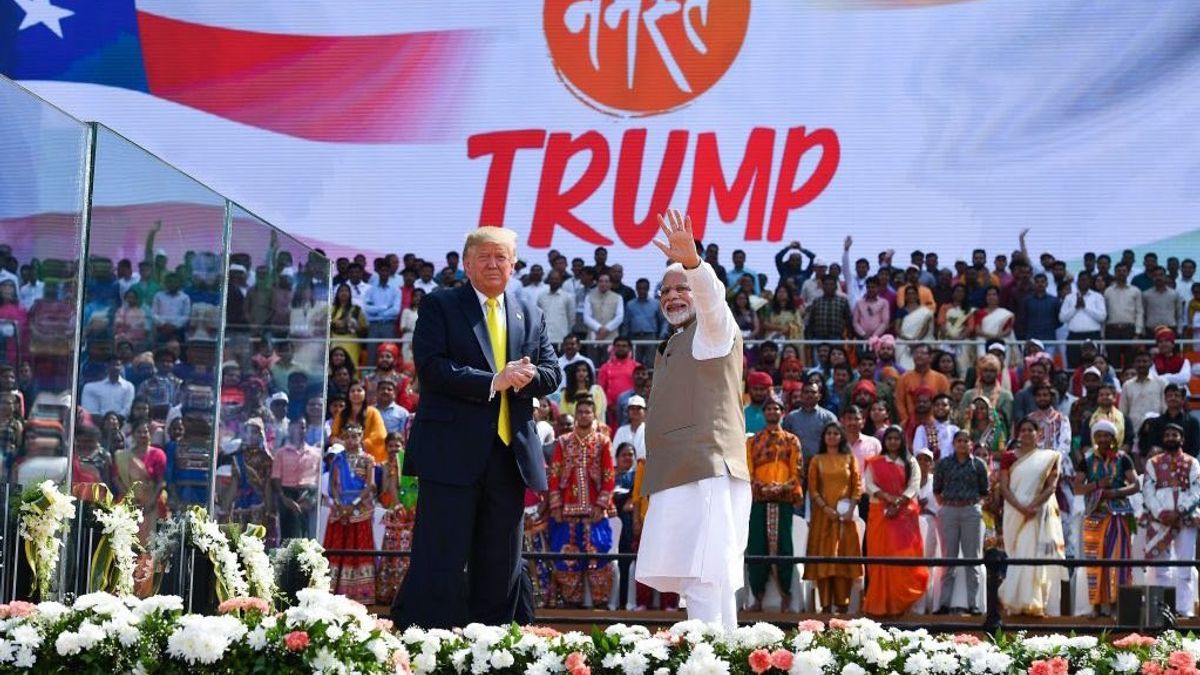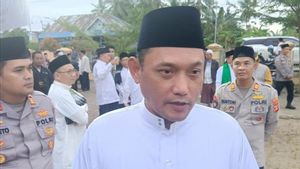JAKARTA - President of the United States (US) Donald Trump for the first time made a state visit to India. Apart from strengthening bilateral relations between Washington and New Delhi, there is a technology agenda behind Trump's visit.
Launching Politico, the tech world is closely watching President Donald Trump's two-day visit to India. Not a few have speculated that the results of this visit will have implications for digital trade, 5G connectivity and other cooperation.
It is also known that White House economic adviser Larry Kudlow is also holding a cooperation meeting to discuss the 5G internet network in the US. Especially Trump's efforts to fight China's influence in his trade war.
"We will discuss issues of common interest such as 5G and bridge the digital divide. And we will aim to deepen the friendship between the oldest and largest democracies in the world," said the chairman of the US Federal Communications Commission (FCC), Ajit Pai in a video post on Twitter.
Almost fifty years after my parents came to the US from India, I'm looking forward to traveling to India along with @POTUS and other US government officials, and participating in bilateral meetings aimed at deepening the friendship between our two nations! 🇺🇸🇮🇳 pic.twitter.com/QTtSYY210k
- Ajit Pai (@AjitPaiFCC) February 23, 2020
According to other reports, Trump's state visit to India can also be interpreted as an effort to reduce the substantial problems of the trade war that occurred between China and the US. In addition to opening up new trade opportunities, the technology world carefully hopes that the US can unlock India's potential in the technology industry.
"Given the critical US-India digital relationship, ITI would like to see substantive discussion on priority technology issues in India. This includes reduced tariffs on ICT (Information and Communication Technology) products, ease of testing and certification requirements, and concrete dialogue for tackling digital problems in India, "said the policy director for the India Information Technology Industry Council, Cody Ankeny.
However, both the US and India are indeed preparing for a summit related to the 5G network in April. The development of infrastructure and other supporting devices will be the US's way of preparing for the 5G internet network.
Especially the technology giant from China, Huawei has already provided its devices that support the 5G internet network. In order not to be left far behind, the US has also nudged European countries, such as Nokia and Ericsson, in preparing the infrastructure for the 5G internet network.
"You will have big telecom operators like AT&T and Verizon and T-Mobile, Sprint which is represented by the big Japanese operators paving the way for software-based solutions to 5G. Big American companies like Intel will be there, Cisco will be there there, Qualcomm will be there, there will be no shortage of American companies, believe me, "said Kudlow in an interview with Fox Business some time ago.
While cooperation in Technology will continue to dominate the India-US bilateral relationship for the next few years, an aspirational knowledge economy can be envisioned as a means of future partnerships. An economy like this will be based on exports of high technology, robotics, artificial intelligence (AI), electric vehicles and other developing sectors.
Commerce between the US and India has increased by more than 40% since President @realDonaldTrump took office. India is now a major market for American exports - and the United States is India's largest export market. A booming America is great for India and the world! 🇺🇸🇮🇳 pic.twitter.com/4mU2RalkjI
- The White House (@WhiteHouse) February 24, 2020
More than 1,200 leading global companies, including those from the US, have set up research and product development centers in India, drawing on available competitive talent. As digital transformation becomes a new strategy for companies around the world, Indian and US companies can join hands to shape lives, businesses and value propositions.
Most likely, AI technology will dominate the business space in the coming years, India and the US can also drive this phenomenon by increasing the capacity of people and companies. Initial collaboration between the two most dynamic new entrepreneurial centers could be identified in areas such as agriculture, health and education.
Please note, if Trump's decision to visit India is not just an ordinary state visit. Trump believes India can be a good stepping stone for the advancement of current US technology.
Especially now that not a few technology companies based in the US are headed by people of Indian descent, such as Satya Nadella, Microsoft's CEO, Alphabet and Google's CEO Sundar Pichai, Adobe Santanu Narayan President and CEO, IBM CEO Arvind Krishna, Google Cloud CEO Thomas Kurian and Mastercard CEO Ajay Banga.
The English, Chinese, Japanese, Arabic, and French versions are automatically generated by the AI. So there may still be inaccuracies in translating, please always see Indonesian as our main language. (system supported by DigitalSiber.id)













